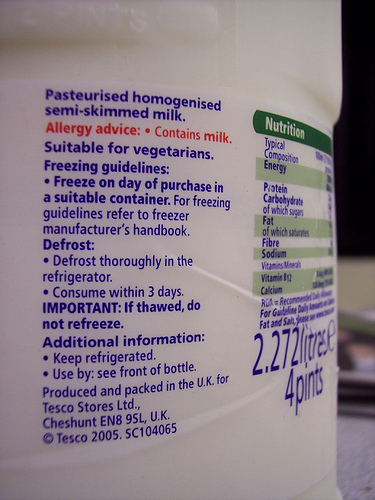“If you bought a Bluetooth headset between June 30, 2002 and February 19, 2009, the settlement of a class action lawsuit may affect your rights.” And if you want to know why your instruction manuals are overwhelmed with worthless wacky warnings, the settlement of this class action lawsuit may explain why.
We’ve covered other ridiculous failure-to-warn-of-hearing-loss consumer-fraud lawsuits, but somehow missed this one filed by the Garcia Law Firm, which was eventually consolidated with twenty-six other lawsuits against Motorola, Plantronics, and GN Netcom (which makes “Jabra” headsets) alleging that the insufficiently advertised risk of hearing loss from turning the volume up too high on a Bluetooth headset was consumer fraud meriting damages, yadda yadda, because, without a wacky warning, people might not know that loud sounds can cause hearing loss.
The settlement is remarkable: the defendants are spending approximately $1.2 million to give notice of the settlement that offers $0 to the class. That’s, right $0. There’s a total $100,000 cy pres award to four charities selected by the plaintiffs, and the manufacturers agree to provide a wacky warning that “Exposure to loud noise from any source for extended periods of time may temporarily or permanently affect your hearing.” Only lawyers like warnings like this. Such warnings make the rest of us worse off; when people see so many warnings “crying ‘wolf,'” it inures them to meaningful warnings.
In return, the trial lawyers are going to ask for up to $850,000 in fees and costs—a remarkable infinite-percentage attorneys’ fee. Nine representative plaintiffs will ask the court for a total of $12,000 in “incentive” payments.
Walter and I often get inquiries on what readers can do when they get notice of a class-action settlement that benefits lawyers to the expense of consumers and businesses. The answer all too often is nothing: asking for exclusion doesn’t prevent the lawyers from cashing in; objecting without the help of an attorney will almost always be brushed off by the court; there is no financial incentive for an attorney to get involved, unless an objector wants to pay their tremendous fees–and there is certainly not an incentive for an objector to spend thousands of dollars to hire an attorney to object to a settlement like this.
The lawsuit is plainly meritless; but it costs Motorola and the other defendants a lot of money to have Kirkland & Ellis and Arnold & Porter litigators dealing with the case. Without a loser pays rule, it’s cheaper for the defendants to pay trial lawyers protection money to go away. Because no one has an incentive to object, the settlements get rubber-stamped, and the trial lawyers go on to file the next extortionate lawsuit. And we all pay higher prices as a result: the $2 million being spent on notice and plaintiffs’ attorneys doesn’t include the hundreds of thousands (and very likely over a million) spent by these companies on defense and in-house attorneys on three years of litigation to date.
In the Grand Theft Auto case, I was a class member, so could file an objection on behalf of myself. I don’t own a Bluetooth headset, so I can’t do that here. But the fairness hearing is in Los Angeles, I’m a member of the California bar and Central District of California bar, and I wouldn’t mind having an excuse to be in California on July 6.
I’m going to float a trial balloon here (and perhaps get my friends at Kirkland mad at me). If you are a reader, and you are one of the tens of millions of members of the class (and please read the notice to ensure that you are), and you find this settlement objectionable, I may be willing to represent you pro bono to file an objection similar to the one I filed in the Grand Theft Auto case, where I argued that the settlement was evidence that the case was meritless and should be dismissed, and in no event should the attorneys get paid off. Please understand that:
- Such an objection, if fully successful in decertifying the class, will preclude you from receiving any money in the class action settlement; you would get zero financial benefit from the objection and would be doing this solely to keep these particular attorneys from stealing $850,000 from consumers, and to be some small deterrent to future trial lawyers against bringing this type of lawsuit;
- There is a non-zero chance that the trial lawyers will ask for your deposition in an attempt to intimidate or harass you, though I suspect that they wouldn’t want to spend the time or money to engage in a fruitless one-hour deposition;
- There is a chance that the judge will ignore the objection and approve the settlement anyway, though we would have the right to appeal to the Ninth Circuit.
What say you, readers? Have you bought a Bluetooth headset, are you sick of extortionate lawsuits, and are you mad enough to go on the public record to say that you don’t think these attorneys should get $850,000?
This is not an April Fools’ joke; this is not an AEI-approved project. This is me, willing to spend my own spare time and money to do some real pro bono work in the original sense of pro bono publico if there is a disgruntled class member out there. (Of course, if there is a outpouring of readers who also want to donate money to defray expenses, let me know, and I’ll set up an Amazon or Paypal donation button.)
(Update: Thanks for the overwhelming response. I’ve selected five volunteers who will be the objectors, which will be more than enough. Stay tuned to Overlawyered for updates on the case.)

